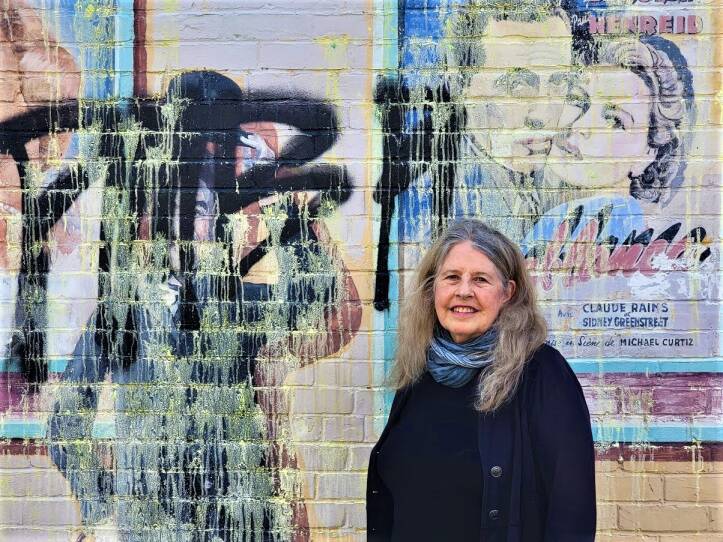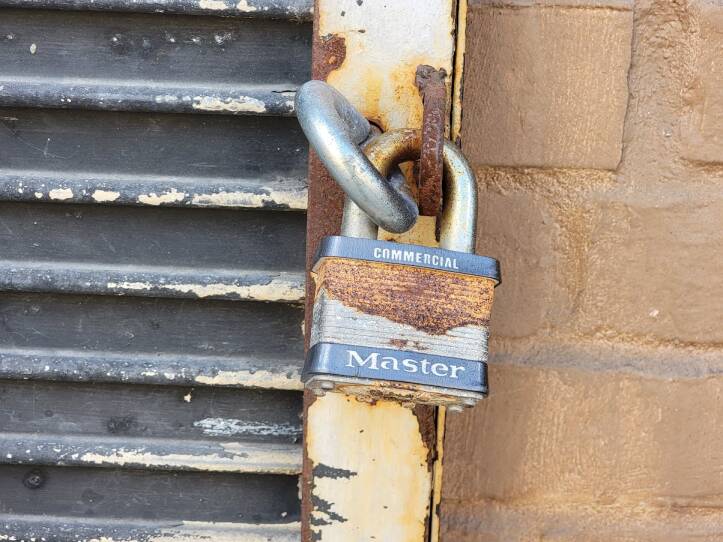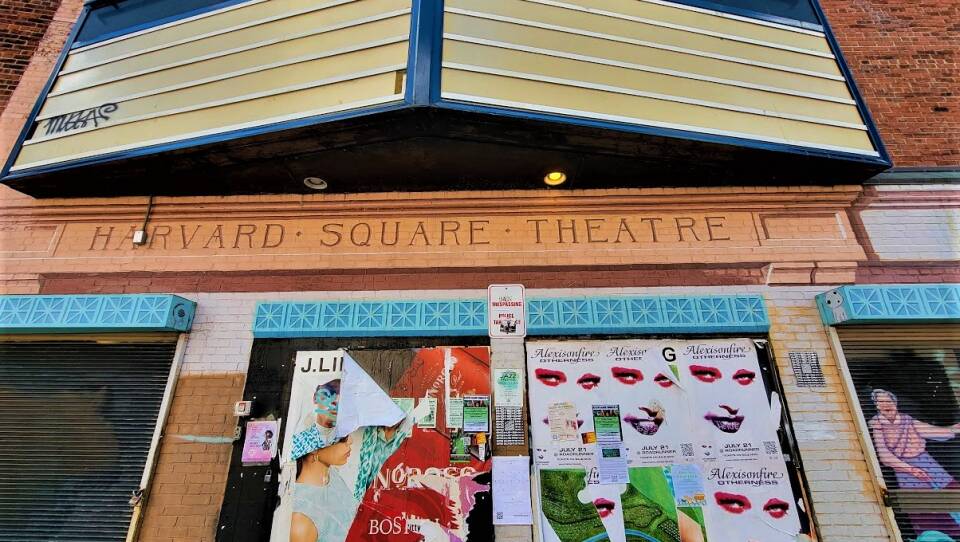The Harvard Square Theatre has sat vacant and desolate on Church Street for more than a decade.
But behind the boarded-up front doors, an effort is underway that could bring the iconic movie theater back to life, according to Michael Monestime, a spokesman for billionaire Gerald Chan. Chan bought the theater in 2015 for $17.5 million, adding to his more than $100 million in properties portfolio in the heart of Cambridge.
“We've ... hired some new staff to help reimagine what's possible to really bring this important site back to life,” Monestime told GBH News last week, “and I hope to have more to report back to you and the Cambridge community in the near future.”
Community leaders say they would welcome any progress on the building after years of vacancy. But that progress will have to wait as designs are drawn up — new designs that reflect a new pandemic world, one where a shrewd businessman might not want to solely invest in a big screen after theaters were starved for attendance for two years.
“From time to time, we've been notified that there are people within the building,” said Denise A. Jillson, executive director of the Harvard Square Business Association, who has been working for years to reopen the theater. “And yes, you know, there are rodents because guess what? It's an urban environment and there are rodents everywhere.”
On an otherwise busy Thursday night this month, there were only a handful of people passing by the shuttered entertainment site, aptly illustrating the decade-old void that has descended on this block of Harvard Square.
Harvard Square boosters complain that the center of gravity for nightlife in Cambridge has shifted to Central Square and say the demise of the theater may be a significant reason why.
For 28 years prior to its closing, the Harvard Square Theatre was the regional showcase site for the “Rocky Horror Picture Show,” a cult classic that attracted devotees in large numbers who dressed up and sang along to the raunchy lyrics while tossing rice and popcorn to the audience.
“Oh, God. I went to 'Rocky Horror' a lot,” said Mark McGovern, a longtime Cambridge City Council member and former mayor. McGovern recalls hanging out in “the pit” in Harvard Square during the day and taking in movies at night. He has led a five-year effort to reopen the theater. In 2017, following a deluge of complaints from residents about the empty building in the heart of Cambridge, the City Council threatened to take over the theater by eminent domain.
“Eminent domain is tough!” McGovern said. “People think it's a very easy thing for cities to do. It's really complicated. But I do think even putting that on the table pushed Mr. Chan a little bit into saying, ‘OK, well, I don't want that to happen. I need to do something with the property.’”
He did. But local opposition and the pandemic got in the way.
A stalled plan
On July 8, 2012, the owners of the moment, AMC Loews, closed down the 90-year-old Harvard Square Theatre and sold it to local millionaire Richard Friedman. Just a few years later, he sold the building to Chan.
Monestime said, over the past five years, the Morningside Group has sought the assistance of several different design consultants to transform the space. “He said Chan engaged the local community, the Cambridge Historic Commission and businesses in Harvard Square in his plan to resurrect the iconic theater.
Architects based in Portugal envisioned a project that would grow the building by 14 feet over its current height, establish retail shops on the ground level with office space above and construct as many as two movie theaters in the building. The designers also wanted to create a mammoth LED-generated light panel on the building’s exterior wall for use by artists and filmmakers.
Fans of the theater and a wide array of organizations involved in Harvard Square’s development cheered on the plan when it was officially proposed in 2017.

“I love the design. It's a fabulous one,” said Suzanne Preston Blier, president of the Harvard Square Neighborhood Association and a professor of art at Harvard University.
Jillson, speaking for the Harvard Square Business Association, added, “it was such an incredibly different and elegant design, but so unlike anything that we had in Harvard Square.”
But according to Jillson, its uniqueness — namely, the panel of LED lights — is also why some opposed the project.
Cambridge is “liberal about some things,” she said. “But I think in terms of the Square, people tend to be a little more conservative.”

For construction to commence, Chan’s design team required certification from the Cambridge Historical Commission, but that board was “concerned about too much light penetration. So the commission, which does an excellent job, put limits on the voltage,” Blier explained. It was assumed that the light display could be seen all the way to Porter Square, but Jillson said that assumption was false.
McGovern, who also took part in discussions, said he never understood the conflict over the proposed facade. “I mean, nobody lives on Church Street. What's the objection? Lights? Different? What's he [Chan] really going to use it for? Is he going to put a picture of himself up there? General Chan, Emperor?” McGovern asked sarcastically.
The role of the Cambridge Historical Commision
The Cambridge Historical Commission denied responsibility for the abrupt halt to plans for reconstruction of the long dormant movie theater.
“In 2017, the Historical Commission had a series of hearings and in the end gave approval in principle to both the demolition of the existing building and the construction or the design of the building that was proposed at that time,” said Charlie Sullivan, the commission’s director.
But Sullivan said the proposed LED display was a consideration.
“It was quite controversial because it was what the architects would call a dynamic facade, and that the facade incorporated LED lights that could play images,” he said. “And the question for the commission and for many members of the public was whether this would be appropriate in Harvard Square.”
In the end, however, Sullivan said the historical commission gave conditional approval to the project. The next step was for Chan’s architects to go before the Cambridge Planning Board. Sullivan said that never happened.
In 2019 the project faded to black.
Monestime, Chan’s spokesperson, said the COVID-19 pandemic stopped the progress. “At the time of moving forward, we were met with a global pandemic that put the world on pause for two years. And so we're analyzing the direction to take the parcel.”
But what exactly that direction will be is still unclear.
New zoning laws for the square that went into effect this year allow for expanded retail space, more local businesses, fewer banks, taller buildings and significantly more residential units. And the zoning changes, Monestime said, are “a tool we didn't enjoy previously.”
New plans are in the works that factor in the zoning changes and will also reflect a recognition that the movie industry has changed dramatically since the theater closed 10 years ago.
Crowds that once packed into the Square to see “Rocky Horror” and other films may not come back, as movie audiences in general have thinned over time. The designers envision the long-dormant site as a multi-entertainment site that would reach beyond the big screen to serve as a music and art venue.
“I would love to see a large theater, but increasingly people are looking at their movies on their website, in their own homes, on their laptops,” Blier said.
Monestime said that Chan is fully committed to bringing “to market something that’s unique, exciting and a great addition for Harvard Square.”
McGovern said he is less concerned about how the Harvard Square Theatre is used, only that it is reopened.
“It might take a couple of years to go through the historical process, go through the whole thing, get construction going, whatever. But if there's no movement, if it's sitting even a year from now like it is today, we’ll have to have some tough conversations about what we can do to push this.”
Produced with assistance from the Public Media Journalists Association Editor Corps funded by the Corporation for Public Broadcasting, a private corporation funded by the American people.






